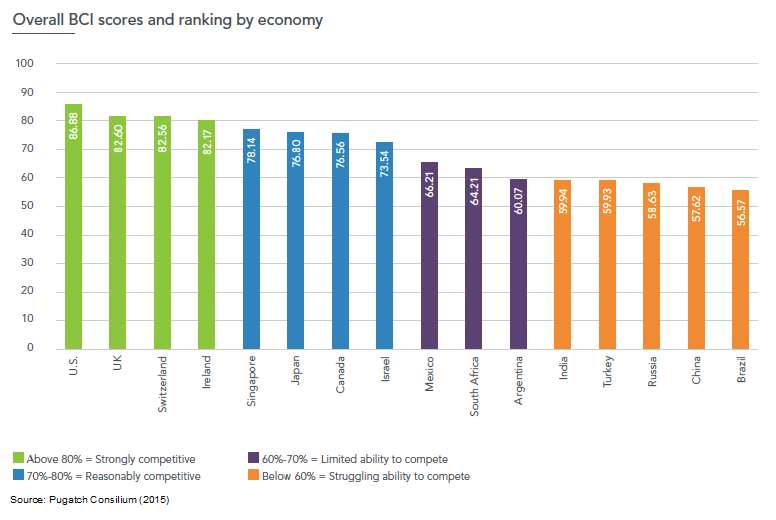
New Study: Policy Environment Has a Significant Impact on Biopharmaceutical Investment
Print
16 June 2015
Meir Perez Pugatch / PhRMA
Economies’ policy trajectories have a significant impact on biopharmaceutical investment decisions, perhaps more than costs and market size, according to local executives. A new study from Pugatch Consilium consultancy finds that economies with policy environments that support investment and innovation rank as the most attractive for biopharmaceutical investment in the eyes of top level executives operating on the ground. The study, Measuring the Global Biomedical Pulse: The Biopharmaceutical Investment & Competitiveness (BCI) Survey (commissioned by PhRMA), finds that notwithstanding low costs and considerable market potential, the BRIC economies plus Turkey still fall into the bottom group of markets sampled in the study.
 The BCI polls local managing directors and high level executives of multinational biopharmaceutical companies in 16 economies as to how different aspects of the local policy environment impact their ability to allocate investments to these markets. By gauging the on-the-ground “pulse” of a given market and translating it into a quantitative score, the BCI enables a unique and highly relevant snapshot of economies’ biomedical competitiveness.
The BCI polls local managing directors and high level executives of multinational biopharmaceutical companies in 16 economies as to how different aspects of the local policy environment impact their ability to allocate investments to these markets. By gauging the on-the-ground “pulse” of a given market and translating it into a quantitative score, the BCI enables a unique and highly relevant snapshot of economies’ biomedical competitiveness.
The BCI also underscores which elements of the biomedical ecosystem matter most to companies in a given market. According to the BCI results, economies scoring in the top half of the BCI are particularly characterized by strong intellectual property (IP) protection, robust and efficient biopharmaceutical regulatory frameworks, and relatively supportive market access environments. In contrast, in relation to economies scoring in the bottom half, local executives consistently cited these areas as being problematic.
The study also uncovers surprising challenges in certain developed markets. In the area of IP protection Canada is an outlier among developed economies, ranked by local executives as the least attractive of the group and scoring a full 20% below the top developed market. At the same time, local executives classified both Canada and Japan’s pricing and reimbursement systems as being particularly stringent, rating the market access environments in both economies more on par with emerging economies than developed ones.
In other words, whether a high- or middle-income economy, the message is the same. In economies where policies affecting the biopharmaceutical environment present substantial challenges, local executives also rank these economies as having a lower ability to compete for investment from their companies. Nevertheless, the BCI also confirms that when these markets take major steps to improve elements of the environment, investment will follow.
 Meir Perez Pugatch is an IPKM Professor of Innovation, Entrepreneurship and Management at the University of Maastricht in the Netherlands. He is also the Managing Director of the Pugatch Consilium group - a boutique consultancy that provides evidence-based research, analysis and intelligence on the fastest growing sectors of the knowledge economy.
Meir Perez Pugatch is an IPKM Professor of Innovation, Entrepreneurship and Management at the University of Maastricht in the Netherlands. He is also the Managing Director of the Pugatch Consilium group - a boutique consultancy that provides evidence-based research, analysis and intelligence on the fastest growing sectors of the knowledge economy.
Conversations and healthy debate about issues facing our industry and the health care system are critical to addressing some of today’s challenges and opportunities. The Catalyst welcomes guest contributors including patients, stakeholders, innovators and others to share their perspectives and point of view. Like in our Conversations series, views represented here may not be those of PhRMA, though they are no less key to a healthy dialogue on issues in health care today.
All Portfolio
MEDIA CENTER
-
The RMI group has completed sertain projects
The RMI Group has exited from the capital of portfolio companies:
Marinus Pharmaceuticals, Inc.,
Syndax Pharmaceuticals, Inc.,
Atea Pharmaceuticals, Inc.

